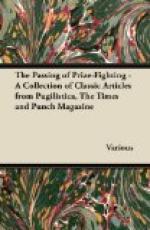* * * * *
So many battle books have been pouring from the press lately that it is difficult to keep pace with them, and harder still to find something fresh to say of each; but quot homines tot points of individual interest, and for those whose concern lies more especially with the New Zealand Forces and their campaigns I can very safely recommend a volume which the official war correspondent to that contingent and his son have jointly published under the title of Light and Shade in War (ARNOLD). Whether it is Mr. MALCOLM ROSS who supplies the light, and Mr. NOEL ROSS the shade, or vice versa, we are given no means of ascertaining. Between them they have certainly put together an agreeable patchwork of small and easily read pieces, most of which have already appeared in journalistic form. It is perhaps parental prejudice that makes Mr. Punch consider the best of the bunch to be “Abdul,” one of three slight sketches that originally saw the light in his own pages. Abdul is a joy, also a thief, a society entertainer, and a Cairo hospital orderly. I can only hope that the story of how he displayed his patient’s sun-browned knees as a raree show to the convulsed G.O.C. and lady, who were visiting the hospital, is at least founded on fact. The publishers are entirely justified in saying that these impressions, made often under actual fire, have both colour and intimacy. So I wish them good luck in the campaign for popular favour.
* * * * *
François Villon, His Life and Times (HUTCHINSON) is one of those fortunate volumes that arrive to fill a long vacant corner. So far as I know, with the exception perhaps of STEVENSON’s study, there has been no means by which the casual reader, as apart from the student, could correct his probably very vague ideas about the Father of Realism. Mr. H. DE VERE STACPOOLE, approaching the subject not for the first time, here essays a brief life and appreciation of the poet, told in picturesque but simple style. Sometimes indeed the simplicity is apt to appear overdone, so that one gets a suggestion that the story is being




